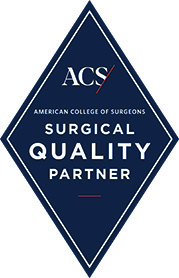Bariatrics at Albany Medical Center
 Our Philosophy
Our Philosophy
Management of weight starts with diet and exercise and making a lifelong commitment to a healthy lifestyle. Our treatment approach is comprehensive and addresses the major factors that lead to the development of obesity.
Treatment options include diet plans, exercise prescriptions, weight loss medications, and weight loss surgery in adults. We offer a variety of surgical options that can be performed laparoscopically, robotically, and endoscopically.
As an accredited bariatric care center within an academic medical system, we offer patients numerous benefits that include top-level surgeons and caregivers, a team approach to care, state-of-the-art services and equipment, and access to the latest treatment options.
The program as a Comprehensive Center with Obesity Medicine Qualifications by the American College for Metabolic and Bariatric Surgery.
Exercise Plans
The American Heart Association recommends 150 minutes of moderate intensity activity a week for cardiovascular health and 300 minutes a week for weight loss. We work with patients to develop exercise plans to achieve their goals.
Assistance in Developing Healthy Habits
Habits are powerful because they are subconscious and influence so many factors in our behaviors. Unhealthy habits include skipping meals, snacking, grazing, and binge eating and can sabotage any successful diet if not approached with caution. We work on changing bad habits for the better.
Weight Loss Medications
When diet and exercise alone are not working, weight loss medications may be a reasonable option. There are many new weight loss drugs currently on the market that we can discuss with patients.
Bariatric surgery can lead to more sustained weight loss. We offer roux-en-y gastric bypass and sleeve gastrectomy. Both are performed using a minimally invasive laparoscopic or robotic approach. Our teams are committed to extensive routine follow-up care to monitor weight loss progress, routine blood work to avoid nutritional deficiencies, and constant reinforcement of life long supplementation paired with nutrition needs for long-term success.
Roux-en-y Gastric Bypass
The gastric bypass procedure is considered the gold standard of bariatric operations.
With minimally invasive gastric bypass, surgeons construct a new, smaller stomach out of the top of the old one. This new stomach is called the “pouch,” and it is the most important part of the bypass operation. The job of the pouch is to provide the early arrival of the fullness that comes with eating.
The gastric bypass operation has been performed for more than 40 years, and it had been performed laparoscopically for the last 20.
Sleeve Gastrectomy
The minimally invasive sleeve gastrectomy is performed by removing approximately 80 percent of the stomach. The remaining, much smaller stomach holds less food, which reduces the amount of calories consumed. By removing the portion of the stomach that produces most of the “hunger hormone,” the surgery has an effect on the metabolism. It decreases hunger, increases fullness, allowing the body to reach and maintain a healthy weight.
The clinic also serves the needs of obese children and adolescents ages 2 to 18 years of age. Our team includes a pediatrician, who specializes in clinical nutrition, and dieticians. We have easy access to the specialties offered at the region's only children's hospital, the Bernard & Millie Duker Children's Hospital.
While we do not offer bariatric surgery to children under age 18, our approach to childhood obesity includes a comprehensive evaluation of the child's nutritional, medical, and psychological needs as they relate to weight loss.
Hear From Our Patients
Bariatric Surgery Eligibility
Body Mass Index
The National Institutes of Health (NIH) uses body mass index (BMI) in conjunction with health problems to determine eligibility for weight loss surgery. Weight-loss surgery may be an option for adults who have a BMI of 40 or more or a BMI of 35 or more with a serious health problem linked to obesity.
Obesity-related Health Problems
Certain medical conditions can put you at higher health risk with obesity. High blood pressure, high cholesterol, diabetes, sleep apnea, fatty liver disease, and polycystic ovarian disease are just a few examples.
Importance of Diet and Exercise
Our process is rigorous and comprehensive in order to ensure the best outcomes for patients long after surgery. We help our patients overcome obstacles so that they are prepared before, during, and after surgery.
Insurance Coverage
Most insurance companies recognize that when your BMI approaches 35, and you are beginning to experience medical problems because of your weight, bariatric surgery can improve your long-term health and quality of life.
Albany Medical Center is recognized as a center of distinction by major health plans in our area. Our pre- and post-operative process is rigorous and comprehensive because we understand the requirements most insurance companies have and can help you navigate the process. That said, there are limitations to each individual plan. Contact your insurance carrier to ask about your coverage.
Before Your First Visit
Before your first visit to Albany Medical Center, please view our educational videos.
Contact Us
If you're considering weight loss surgery, take the next step and meet with our bariatric team. Our experts will help determine if you are a candidate. They will help you make an informed decision and start you on the path to a healthy life.
To schedule an appointment with Albany Medical Center, or for more information, call 518-262-0942.

